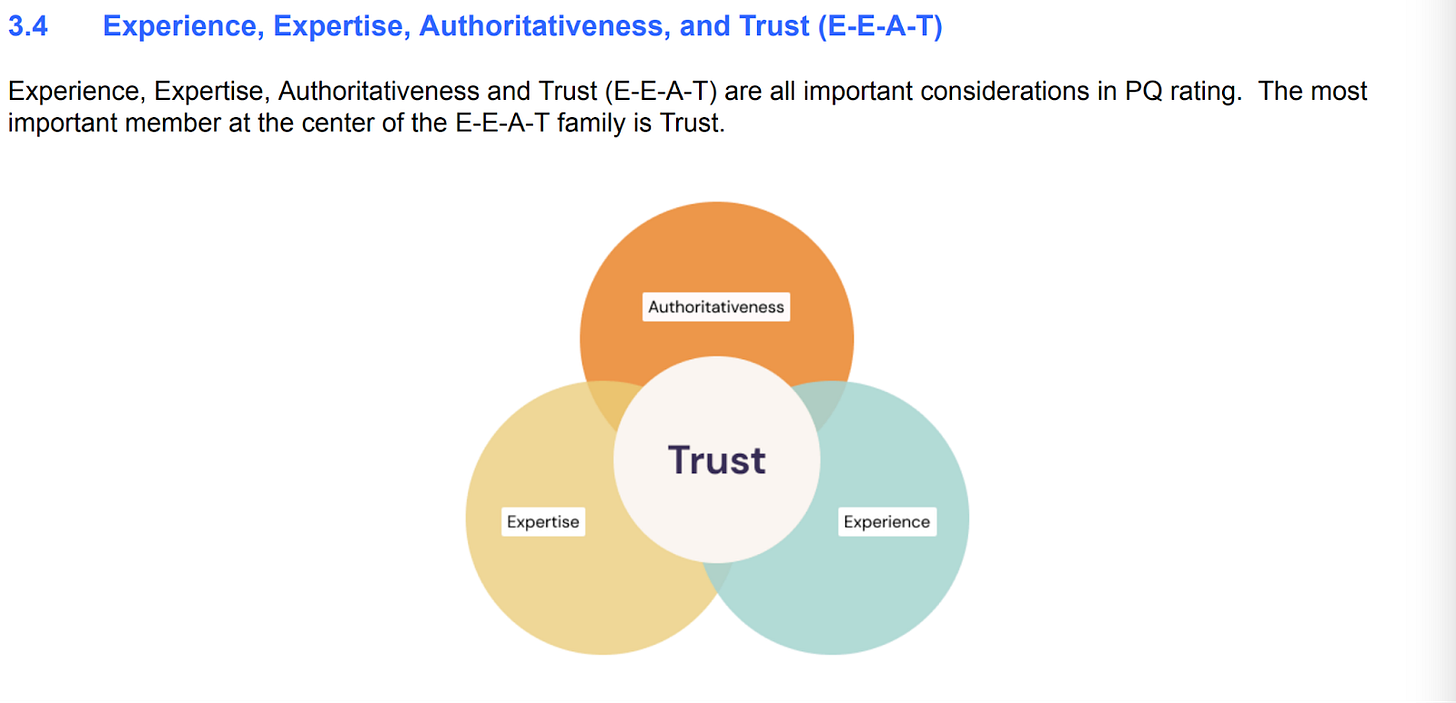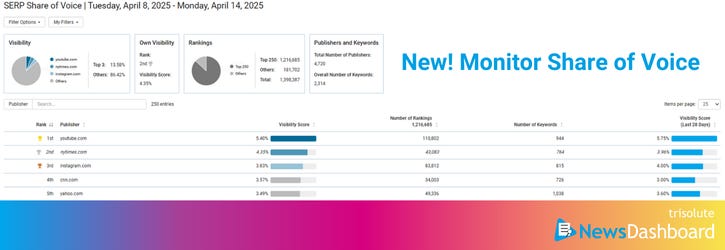What to know about Your Money or Your Life
We cover what YMYL is, what Google’s guidelines say about it and the role of E.E.A.T.
#SPONSORED
Don't Panic! Get Trisolute News Dashboard
Trisolute builds tools to help news publishers demystify the news SEO universe and increase Google visibility.
Why Trisolute?
New! Monitor share of voice up to 250 publishers
Real-time optimization action suggestions
Competitor performance intelligence
Discover entity analysis to reveal topic authority
Hello, and welcome back. Jessie here, back from another crochet and concert-packed weekend. This time, it included completing my Maud tapestry and the delightful (and emotionally devastating) Rose Cousins.
This week: An introduction to the Your Money or Your Life (YMYL) content. We cover what YMYL is, what Google’s guidelines say about it and the role of E.E.A.T. In future newsletters, we will cover tactics to improve YMYL content and more!
Join our community of more than 2,100 news SEOs on Slack to chat any time.

Let’s get it.
In this issue:
What are YMYL pages?
What has Google said about YMYL?
What’s the role of E.E.A.T?
THE 101
What are Your Money or Your Life pages?
Your Money or Your Life (YMYL) refers to content on topics that can impact a person’s future happiness, health, financial stability or safety. It’s a term used in Google’s guidelines for quality evaluators (more on this below).
YMYL topics include news content, financial information, shopping, health and safety, as well as information about groups of people (for example, nationality or race). Pages that broadly cover these topics — such as content about fitness or finding a job — are also considered YMYL.
Why it matters: Google treats YMYL pages differently — and holds them to a higher standard — because of the potential real-world harm caused by poor or inaccurate information. A page with incorrect information about the Minecraft movie might be annoying, but false information on treating the flu poses real harm to real people.
These pages need to highlight first-rate E.E.A.T (Experience, Expertise, Authoritativeness and Trustworthiness), with trust being considered the most important factor (according to Google).
“Untrustworthy pages have low E.E.A.T no matter how Experienced, Expert or Authoritative they may seem,” the guidelines say. In other words: if a page lacks trustworthiness for any reason, it is considered to have low E.E.A.T.

As news organizations regularly cover a broad swath of YMYL topics, it is essential publishers demonstrate E.E.A.T for these pages. YMYL content without strong E.E.A.T signals is unlikely to rank well on search results.
🔗 Read more: How to improve E.A.T for YMYL pages
What has Google said about YMYL?
YMYL covers topics that have a “high risk of harm,” as these content areas could affect the “health, financial stability, or safety of people, or the welfare or well-being of society,” according to Google’s Quality Rater Guidelines.
What are the QRG? Search Quality Rater Guidelines (QRG) are the instructions employed by Google’s human evaluators, who are known as Search Quality Raters. These raters are tasked with evaluating content and providing insights based on Google’s guidelines to “help make sure our systems — and proposed improvements — are working as intended,” according to a blog post.
To determine if a topic is YMYL, Google considers what harm might occur with each category:
Health or safety: If the topic could hurt mental, physical and emotional health;
Financial security: If the topic could impact a person or family’s means of financial support;
Society: If the topic could affect people groups or public trust;
Other: Topics that hurt the welfare or well-being of society as a whole.
Google’s guidelines say that YMYL assessment “is a spectrum,” meaning topics can be considered “clear YMYL, definitely not YMYL or something in between.” The more explicitly a topic is considered YMYL, the higher level of scrutiny it will receive from Google.
News events are considered against the YMYL spectrum, too. Google’s guidelines suggest that stories about violence are categorized as clearly YMYL, whereas the outcome of a local sporting event is likely not.

News articles on topics that are clearly YMYL topics must be rigorously reported and fact-checked, with that trust-building work clearly communicated to readers.
For example, a byline with a placeline that says, "Elizabeth Russo, reporting from Vatican City" is a clearer signal of experience and trust than "Staff." (Sometimes a "Staff" byline can't be avoided, and that's okay. But where possible, always attribute reporting.)
In a blog post about creating helpful and people-first content, Google notes that experience, expertise and authority all contribute to building trust, but content doesn’t necessarily have to demonstrate all four pillars.
THE HOW TO
What to know about E.E.A.T and YMYL
E.E.A.T — the factors of Experience, Expertise, Authoritativeness and Trustworthiness — are used as part of Google's QRG to evaluate the quality and credibility of content on the web. It’s a human-centered, audience-first concept that helps Google's raters evaluate the quality of content to surface for certain queries.
After first introducing the concept of E.A.T. in 2014, Google added an extra “E” — Experience — in 2022.
While it is not a direct ranking factor, Google wants to surface content that demonstrates strong E.E.A.T. For news publishers especially — that produce more YMYL content than most non-news sites — understanding and putting into action the four pillars of E.E.A.T is crucial.
E.E.A.T is not a single metric or score used to grade content. However, Google encourages creators to use it as a framework to “self-assess their own content” and improve it for better performance in search.
Publishers need to prioritize building and demonstrating E.E.A.T for YMYL in order to rank well in search results. It should be emphasized across your entire website. To improve E.E.A.T, start by focusing on strong author bios that highlight expertise, gaining backlinks from reputable outlets, citing quality information and doing original reporting.
Experience vs expertise for YMYL topics
The purpose of some YMYL articles will be sharing personal accounts or to learn from the experiences of others. In these instances, Google says pages sharing first-hand life experience on clear YMYL topics “may be considered to have high E.E.A.T as long as the content is trustworthy, safe and consistent with well-established expert consensus.”
For example, an outlet may produce journalism on navigating a scary health diagnosis, or being supportive to a loved one dealing with financial strain. These are clearly YMYL topics: personal health and financial security. However, the primary purpose of these pages is to share personal experiences. Straight, fact-based information from authoritative sources may not be the most useful in this scenario.
In these cases, people-first content that focuses on experience can be incredibly valuable — sometimes even more so than an expert-written piece. The guiding question should be, “What is most helpful for my reader?”
The final product should still employ rigorous fact-checking and have clear signals of trustworthiness. Use your judgment when assigning, and ensure the highest editorial standards are met.
The bottom line: Google holds YMYL topics to a higher standard, as false information in these areas can cause real-world harm. Publishers must demonstrate high E.E.A.T for content within these topics to rank well in search results and be considered for Google’s quality reader guidelines..
#SPONSORED - The Classifieds
Get your company in front of around 13,200 writers, editors and digital marketers working in news and publishing. Sponsor the WTF is SEO? newsletter!
THE JOBS LIST
These are audience jobs in journalism. Want to include a position for promotion? Email us.
The Athletic is hiring an Editorial Manager, Programming (U.S. or Canada, Remote).
The Athletic is hiring an Associate Programming Editor (U.S. or Canada, Remote).
RECOMMENDED READING
Google news and updates
🤖 Barry Schwartz: Google Discover will launch on the desktop homepage, following years of testing.
🤖 Barry Schwartz: Google confirms that AI Overviews will include links to more search results.
🤖 Matt G. Southern: Google adds image search to AI Mode and expands access to more users.
🤖 Danny Goodwin: Google’s quality raters now assess whether content is generated by AI.
🤖 Barry Schwartz: Hreflang tags that point to a 301 redirect are probably okay, says John Mueller.
Even more recommended reading
🔍 Harry Clarkson-Bennett: AI and the future of search: A deep dive.
📈 Barry Schwartz: Google Search ranking volatility reported on April 9 an 10. (Google has not confirmed any update/change.)
🧑💻 Purna Virji: Creating a human-first content strategy in a machine-first world.
💻 Beeri Amiel: What should content strategy be for LLM Optimization?
✏️ Alexandre Hoffmann: Here’s how to close the gap between SEO recommendations and executions.
What did you think of this week's newsletter?
(Click to leave feedback.)
Catch up: Last week’s newsletter
Have something you’d like us to discuss? Send us a note on Twitter (Jessie or Shelby) or to our email: seoforjournalism@gmail.com.
Written by Jessie Willms and Shelby Blackley








